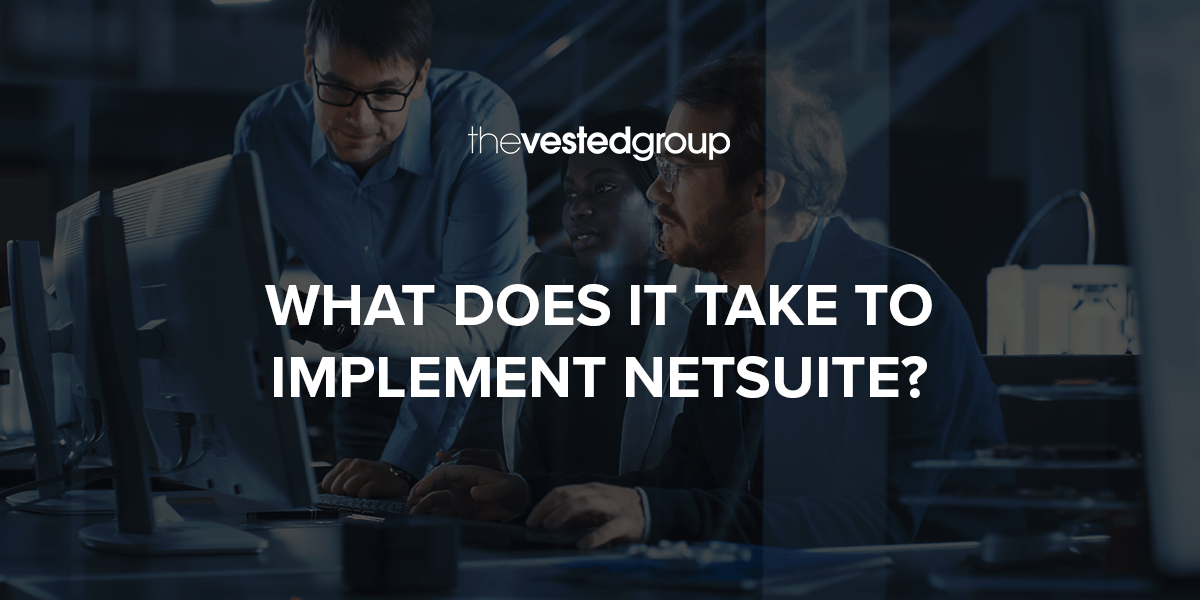
Every business owner has the goal of improving operations and becoming more efficient. In today's technology-focused and data-centric world, you need to make sure you're keeping up with the times. With the right enterprise resource planning (ERP) software, you can achieve this next level of productivity.
Oracle's NetSuite is an ERP suite that includes diverse software applications to help you perform the essential functions of your business. If your company's legacy software is holding you back, consider exploring a NetSuite ERP implementation. Continue reading to discover the best approach to successfully implementing an ERP system for your business.
- Start With The End In Mind
- NetSuite Implementation Timeline
- Can I Implement NetSuite Myself?
- ERP System Implementation Phases
Start With the End in Mind
One of the first steps on your Oracle NetSuite ERP implementation timeline should be to anticipate the future. With proper planning, your business will change for the better after your NetSuite implementation. Here are some things you should keep in mind as you consider how your operations will look when your NetSuite project implementation is complete:
- Identify how ERP fits with your strategic goals: Most companies that identify ERP as a need are struggling to grow and scale in their existing systems. The ownership and C-Suite of your company will want to know how spending money on ERP systems will help them accomplish their long-term strategic goals.
- Identify your non-negotiables: If you're willing to transition to a new ERP system, you need to have specific goals to track the success of your implementation. Ask yourself some questions as you enter the planning stage. What do you want to accomplish with NetSuite? What business processes are you trying to simplify? Answer these and other questions and keep these answers in mind as you move forward with the process.
- Identify your flexible areas: You probably have processes that are not strategic or competitive differentiators. Is it possible to use out-of-the-box processes to save on resource effort and budget? Typically, 20% of processes have a significant strategic and competitive impact. These should be non-negotiable and continued in new ERP systems. Another 80% don’t have a huge impact and you should have some flexibility in the way you perform these processes in the future.
- Manage your expectations and determine your key performance indicators (KPIs): It's also important to manage your expectations to keep a realistic outlook on what will happen once you've completed your NetSuite implementation. Understand the benefits and keep an open mind along the way in case any unexpected events do occur. Determine your KPIs so you can track the progress you're making toward reaching your goals.

NetSuite Implementation Timeline
As you approach this new process for your business, you may be wondering how long an ERP implementation takes. On average, the whole process of implementing NetSuite from start to finish could take up to three months. While this may seem like quite a bit of time, it's actually far less than other types of ERPs, which can have a much longer and more complicated implementation process.
Keep in mind, though, that the time it takes to complete your ERP implementation could be more or less depending on the complexity of your business requirements. Two of the main factors affecting your timeframe are your current software and whether you want to integrate said software with NetSuite. If you have specific customization needs, then this can also add some length to your implementation timeframe.
As you read in the previous section, it's important to manage your expectations, set reasonable goals and keep an open mind throughout the implementation process. While transitioning to NetSuite will take some time, having properly running software at the end of the process will be more than worth the wait.
Can I Implement NetSuite Myself?
For a variety of reasons, some companies consider implementing NetSuite themselves with minimal or no outside help from a professional services team. While this is technically possible, it may not yield the best results. Getting outside help from companies like The Vested Group ensures the implementation process is simple, clean and effective. With professional help, even the trickiest transitions from your legacy software to new ERP software can be easy and seamless.
The Vested Group understands that one of the main reasons many companies want to implement NetSuite themselves is finances. When it comes to turning a profit, it may seem like completing your NetSuite implementation checklist with a professional could be out of your budget. That's why The Vested Group offers a simplified implementation program for those companies who want to save money or avoid having an outside team come in to oversee their ERP configuration steps.
The simplified implementation program from The Vested Group, called SIMPLEmentation, offers businesses a chance to perform a self-guided process for implementation. The Vested Group lays out the steps for you to take so you can move forward with confidence. They also offer all the support and help you could need every step of the way, giving you even more power to perform your own in-house implementation process.
Having professionals like The Vested Group complete the implementation process is often the ideal approach. However, if you'd rather do it yourself, it's good to know that The Vested Group's SIMPLEmentation process exists to make it possible.
ERP System Implementation Phases
Every NetSuite implementation process requires a set of steps for success. Here are the ERP implementation phases you'll experience when your business transitions its ERP to NetSuite:
- Program initiation: This first phase of the process includes initial meetups that lay the foundation for the rest of the phases. You'll discuss items like software licensing, project planning and an overview of requirements and design. This step will determine if NetSuite is, in fact, a good fit for your business.
- Solution design: This step will let you focus on any requirements and identified gaps in the process discovered in the previous phase. The Vested Group can help you present alternative solutions if any gaps present themselves.
- Application configuration: In this stage, we take everything we learned in the previous phase and use that information to begin configuring your NetSuite implementation.
- Testing and preparation: After configuration, the testing and preparation phase is critical to ensuring the system operates properly. This stage also includes adequate training to ensure you and your team are ready and able to use your new NetSuite ERP.
- Deployment: This stage is the equivalent of "going live." Here, we ensure your legacy data is ready for transfer and that software is ready to perform its intended tasks.
- Support: The Vested Group understands that a certain period following deployment can reveal issues or gaps in NetSuite implementation that you'll need help addressing. Dedicated consultants will work with you during this phase to help you overcome these issues.
Let The Vested Group Help You Implement NetSuite for Your Business
There are several possible answers to your need for a new ERP, but working with a NetSuite partner can make the implementation process as easy as possible. Whether you want our team to come in and help you directly or you want to utilize our SIMPLEmentation process, we are here to help you achieve successful NetSuite integration for your business. Our aim is to support your ERP transition every step of the way.
Contact us today for more information about how we can help you reach your business goals. We look forward to serving you.






